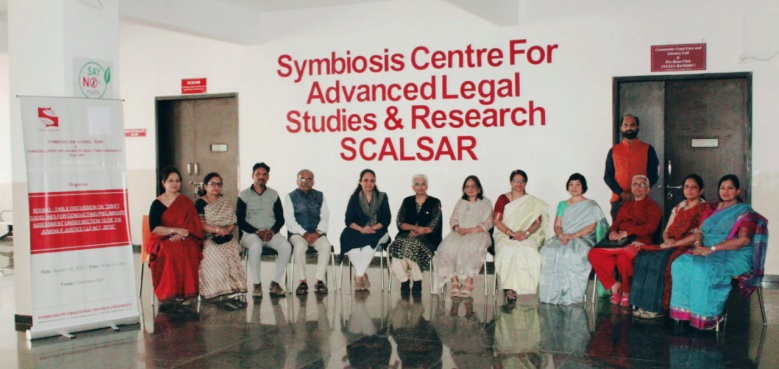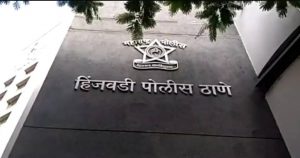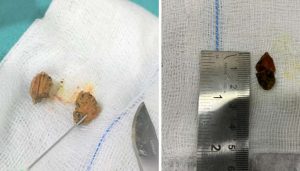Pune: Round Table Discussion on ‘Draft Guidelines for Conducting Preliminary Assessment under Section 15 of the Juvenile Justice (JJ) Act, 2015

Viman Nagar, 21st January 2023: Symbiosis Law School, Pune, a constituent of Symbiosis International (Deemed University) & Symbiosis Centre for Advanced Legal Studies and Research (SCALSAR) in pursuance of invitation from the National Commission for Protection of Child Rights hosted a Round Table Discussion on January 16, 2022, on ‘Draft Guidelines for Conducting Preliminary Assessment under Section 15 of the Juvenile Justice (JJ) Act, 2015.’
Prof.Dr. Shashikala Gurpur, Fulbright Scholar, Director, Symbiosis Law School, Pune, Dean, Faculty of Law, SIU, Jean Monnet Chair Professor (EUC-LAMP co-funded by EU) delivered the welcome address. She gave a brief overview of the theme and discussed the Role of Gender Justice and Securing Human Rights, while stressing the importance of living justice. She shed light on the significance of the event, which coincides with the core purpose of SLS, Pune, which is to make difference in people’s lives. Subsequently, she put forward her expectations from the discussion, which would result in a holistic contribution to the cause and committing to the truth with deep compassion. Dr Gurpur enumerated the three-fold objective of the round table discussion: comprehend the letter of law, preliminary assessment and overcoming the challenges.
Dr.Gurpur discussed the Principle of Best Interest and Right to Privacy of Juveniles. She highlighted the role of privacy in Juvenile development and emphasized the need to make efforts to protect the children, based on the aforementioned principles. She further discussed the Individual Coaching and Restorative Justice models which are in the best interest of Juveniles.
Dr. (Mrs.) Justice Shalini Phansalkar Joshi, Former Judge of Bombay High Court elaborated on the delicate nature of preliminary assessment dealing with a special class of citizens. She gave a brief review of Section 15 of Juvenile Justice Act, 2015 and discussed the General principles of presumption of innocence, and participation, in relation to right of the child to be heard. She pointed out the absence of the principles in the Guidelines for the Juvenile Justice Board. She also deliberated upon the Principles of Natural Justice and Principle of Safety and suggested incorporating Positive Measures and Non-Waiver of Rights.
Dr. Asha Bajpai, Former Professor of Law and Founding Dean, School of Law, Tata Institute of Social Sciences shed light on the shift in focus from the child to the nature of offence post the Nirbhaya incident. She highlighted the loopholes in the decision-making process of Juvenile Justice Act and suggested that accountability and sensitization to the rights of children and Supreme Court and High Court Judgments should be incorporated into the framework of guidelines.
Dr Sheila Ramaswamy, Technical & Operational Lead at SAMVAD ( Support, Advocacy & Mental Health interventions for children in Vulnerable circumstances and Distress) brought to light SAMVAD’s position on Juvenile Transfer. Further, she discussed NIMHANS’s Preliminary Assessment Methodology and how it is interpreted and evaluated under Section 15 of the Juvenile Justice Act, 2015. Dr Ramaswamy recommended treatment and rehabilitation interventions of the child, based on the interests of the child.
Dr Harish Shetty, Psychiatrist, Member of NTA, Founder of ‘Maitri’shared his insights and role of experts in Preliminary Assessment of the Juvenile. He pointed out that, “Nine out of Ten preliminary assessment reports do not stand the test of time and are not written with thorough investigation.”He addressed the issues raised by other dignitaries on the impact of abuse and trauma and tendency to commit crime as a result of it.
Dr. Jaya Sagade, Professor and Scholar in Child Rightsemphasized on the dire need of the solutions for the questions posed. She encouraged students to challenge the constitutional validity of Section 15 of the Act. Further, she pointed out the need for qualitative analysis for the transfer of cases and addressing the cases with sensitivity.
Adv. Shirin Merchant, Senior Advocate, Pune discussed the ground reality on assessing the mental capacity of adolescents by sharing her personal anecdotes. She emphasized on putting the onus on the parents, instead of assessing the child and suggested incorporating psychology in the curriculum of law to felicitate the understanding of human behavior. Mr. Harish Awachar, Representative of Maher, brought forth the challenges faced in juvenile care from a NGOs point of view by sharing his personal anecdotes.
Dr. Swarupa Narayan Dholam, Registrar, State Human Rights Commission clarified the difference between Social Investigation Report and Preliminary Report and shed light on its purpose which is Personality assessment at the preliminary stage of the trial.
Adv. Chaitraly Deshmukh, Journalist and PhD Scholar in Child Rights highlighted the various Issue and challenges faced while categorizing Juvenile Conflict with Law in the age group of 16-18 years as an adult. She highlighted on lack of availability of adequate experts especially psychologists or psychiatric. Further, she discussed the issues with the legal aid counsel and their training and emphasised on the need for an individual care plan for juveniles who are tried as adult offenders.
Dr. Dhanawade, Member of Juvenile Justice Board, Pune concluded by emphasizing working on the root cause of crime and taking necessary support from NGOs for the protection of children. The vote of thanks was delivered by Dr Aprajita Mohanty, Deputy Director (Academics), SLS Pune.









